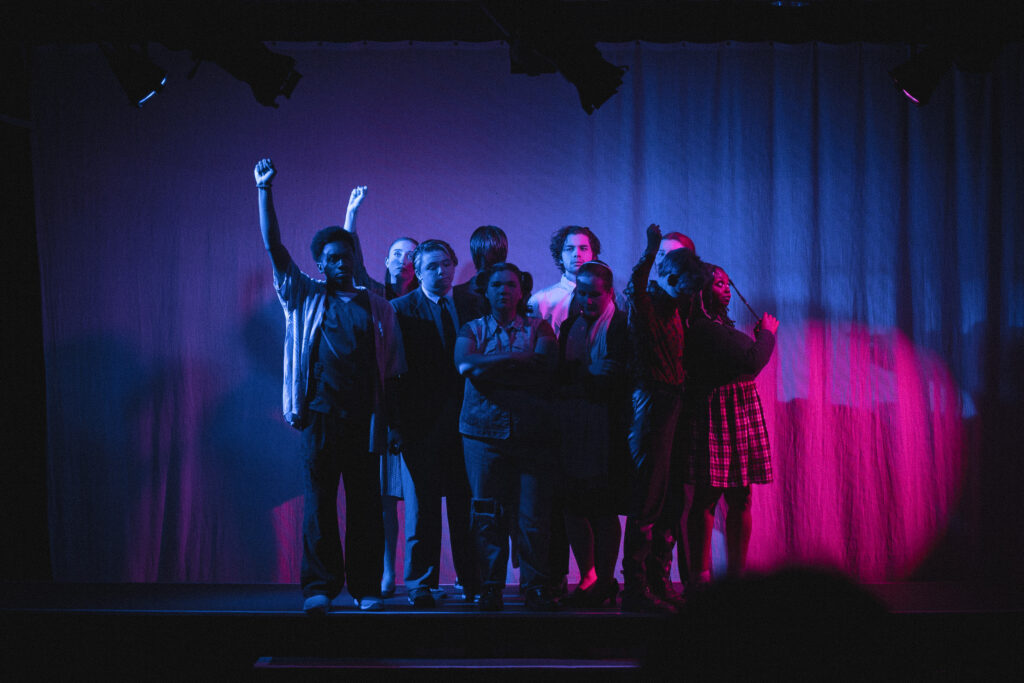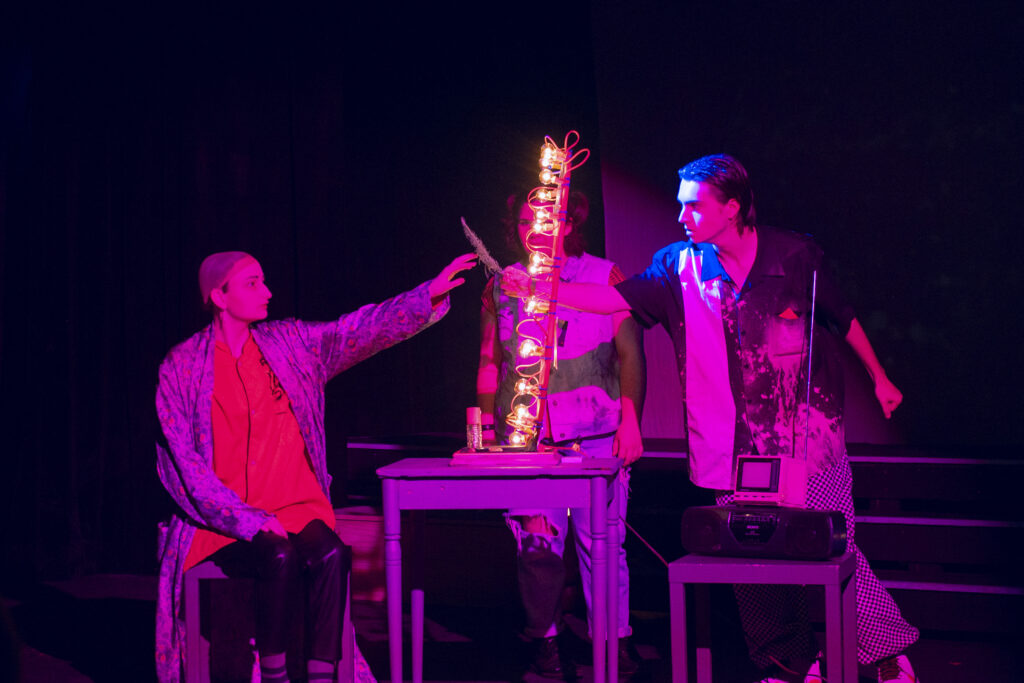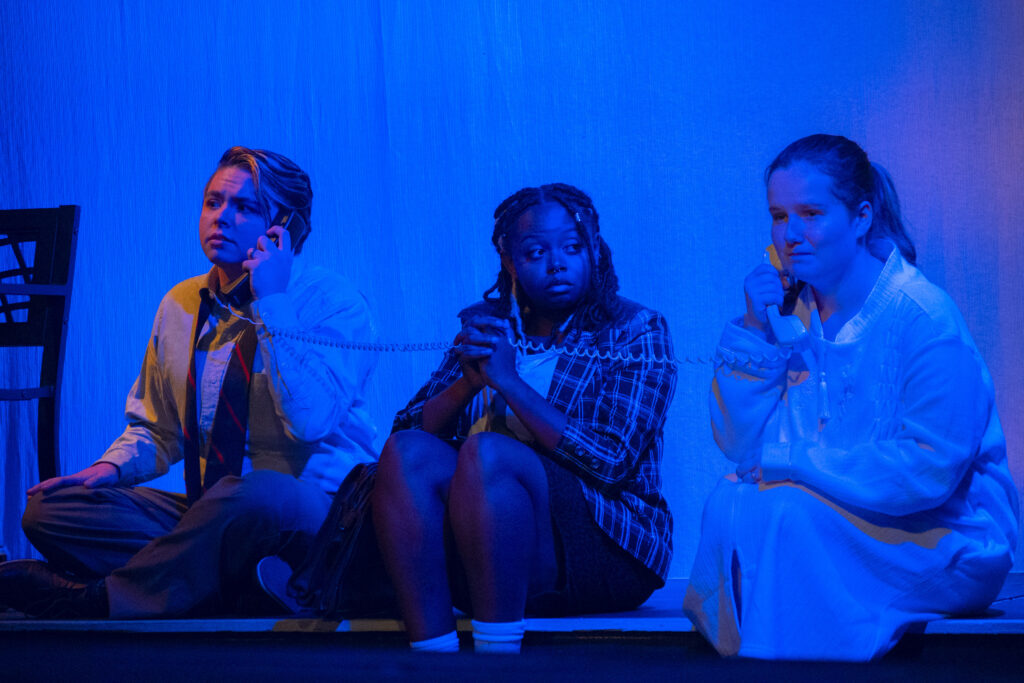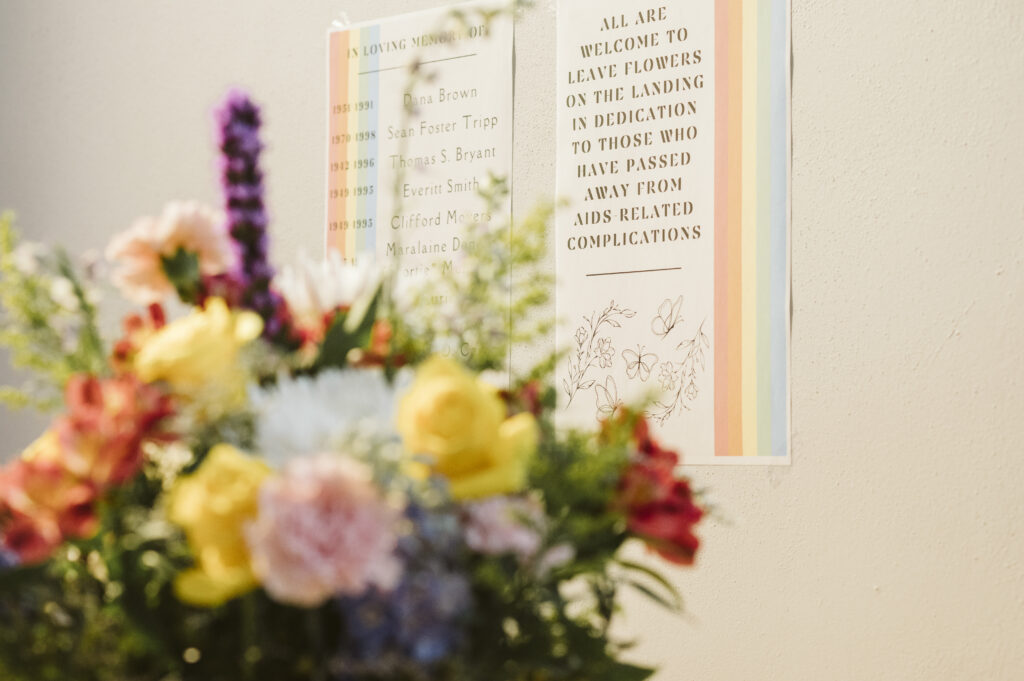Breaking from the Script: A Community-Driven Approach to Theatre at MBU
MBU’s undergraduate theatre department has turned the process of running a university theater inside out by putting community first. Students and faculty alike have received this initiative with excitement, energy, and enthusiasm and, in just a few years, the department has seen their new approach pay dividends.

Like most college experiences, it begins in the fall with a 100-level course — THEA 116: For All Seasons. Students gather in Associate Dean and Assistant Professor of Theatre Dr. Kerry Cooke’s classroom to discuss the direction of the theatre department for the upcoming season of plays.
Unlike a traditional theatre department, where faculty typically choose productions and assign roles based on a predetermined curriculum or departmental priorities, MBU’s process is student-driven from the very beginning. Rather than merely auditioning for roles or participating in technical assignments dictated by faculty, students play an active role in shaping the entire season. This model not only fosters deeper engagement but also allows students to see firsthand how their choices shape the department’s artistic vision.
They start simply with discussion.
Guided by Cooke, students discuss the existing community at Mary Baldwin, the nascent interests that they share, and the types of stories that reflect their realities. Then, they collaborate to make plans for bringing these threads together on stage.
“Ultimately, it’s a community-building class where we think about ourselves, our peers, and try to understand how our season is reflecting our classmates and the population of the campus as a whole,” Cooke explains. “We start by thinking about art broadly before honing in on plays as an art form. Then, by the third or fourth week of class, we start to think about what plays we want to see, what plays we want to be in, and by the end, they’re pitching individual plays that they’re interested in for the faculty to consider for the season of next school year.”
Building Community to Serve the Community
This process is unique to MBU’s theatre department — the faculty developed it to better engage students in the theatre department and in the wider community. Especially after the COVID-19 pandemic, the theatre department saw an opportunity to not just develop their own community, but to serve as a hub for all of MBU to connect and reconnect.
After taking Cooke’s class, students might next revisit the selected plays in an acting class, or a set-building practicum, or in Theatre Chair and Assistant Professor Molly Seremet’s class, THEA 223: Directing Methods. Seremet has seen the impact of the department’s approach in her own students:
“I think that the primary benefit is agency for our students. So much of the way we work as a department is to help our students understand themselves as decision makers and as changemakers. Part of the reason we do this is because it gets students interested — it hooks them.”
Visiting the theatre department on the ground floor of the Deming Fine Arts Building, you can see just how invested the students are in Seremet’s class.
Despite missing a handful of participants due to wintertime illness, this group avoided all the awkward silence you might associate with tired students waiting for class to start.
Instead, they were already engaged with the material, before Seremet even entered the room. Some were showing each other sections of their “inspiration journals” while others were demonstrating the choreography they’d been working out since the last class session.
This might not sound so out-of-character for theatre majors, and it wouldn’t be — if they were all theatre majors.
One of the by-products of the department’s new approach is that it has significantly increased the portion of non-majors who take a theatre class to fulfill general education requirements in art, writing, or oral presentation.
These first- and second-year students haven’t engaged with the department’s process before arriving to class. In fact, in most cases, they haven’t ever spent time in a theater. But because of the department’s commitment to serving the community, and the dedication that inspires in their theatre classmates, these students are engaged all the same.
For Seremet, this is where some of the best fun begins. “But then, we get to take them deeper,” she explains of the students in her classes. “Our students liked Angels in America because of the play it is and what it has to say, but then we get to show them how it can connect with them and how they can tell a story of themselves through the play. It gives them that agency to not just pick what they do, but also build investment and self-discovery because they are so involved in the work.”
Angels in America was among the first productions brought to the stage through this student-driven model, and it marked a significant milestone for the department. More than just a performance, the production became an interdisciplinary event. A portion of the AIDS quilt was displayed, and students created an interactive historical timeline to contextualize the play’s themes. The event drew engagement from across campus, blending history, performance, and activism into a single, impactful experience.
One of my absolute favorite things about our department is that you don’t need to be a theatre major to be a part of the theater.
Molly SeremetAssociate Professor of Theatre
These students and their previously-untapped interest have strengthened the base of performers, production assistants, and audience members that the theater relies on.
“There’s probably a better way to say this, but: it is amazing to me how much students care,” Seremet jokes. “Even General-Education students who come into this process, they get so involved. Their interests and their passions become a part of the narrative. There is kind-of no such thing as ‘dropping in.’ One of my absolute favorite things about our department is that you don’t need to be a theatre major to be a part of the theater.”
The Students’ Perspective
For Noah Bowles ’28, a marketing major, his journey into theatre at Mary Baldwin University wasn’t something he ever anticipated. “I was never involved in theatre before, and my advisor suggested I join JP [Scheidler, assistant professor of theatre]’s class to fill out my credits,” he recalls. That class, Basic Production, set him on an unexpected path. “Since you need to get a certain number of hours to fulfill your obligation for the class, I took on the role of assistant stage manager. It was something I could do in the afternoon to take my mind off of classes for a while. And it gave me a sense that I could be a part of the productions in a way I never thought I could before.”
Bowles’ perspective on theatre evolved as he became more involved. “I don’t have much experience with plays — I’ve never actually seen a play — and I didn’t know that being backstage was a real job. That there was stuff you can do in addition to acting and directing to be a part of the show. I have a personal philosophy of trying everything once, so it was a good experience for me.”
His role as assistant stage manager for Angels in America left a significant impact. “It’s hard to describe, but it really made it feel like I actually had an impact that people enjoyed and were entertained by. It gave me a lot of insight into how plays work that I didn’t consider before.”
For Analise Toone ’26, a theatre major, the experience was quite different — she had always known she wanted to do theatre. “My first semester, I took Script Analysis and Basic Production with JP. It was awesome. The Script Analysis class turned out to be really foundational for my understanding of theatre,” she explains. Over time, her passion shifted. “I’ve really changed from being a theatre practitioner to wanting to be a theatre scholar. I’ve fallen in love with wanting to analyze plays and spend time thinking about them more than actually doing them.”
Her experience in the department has also opened her eyes to a broader history of theatre. “It might sound silly, but I never really thought about the idea that women wrote plays. I had come from a really narrow scope of what theatre was — basically like Shakespeare and Ibsen — and I’ve really fallen in love with the history of women in theatre.”
Both Bowles and Toone credit the theatre department’s structure for fostering a deep sense of community and engagement. Toone, who was part of the class that selected Angels in America for production, experienced firsthand how the department’s collaborative approach shaped the final product.



“In my second theatre history class, we looked at Angels in America from a theatre history perspective. Then, in May Term, we had THEA 210, where we knew we wanted to do Angels in America and divided into groups to work on different elements of the play. We had to do this because, looking at our theatre and our community, there were some parts of Angels in America that seemed unfeasible. So we got together as a class and dedicated our time to solving those problems.” That May Term experience directly led to Toone taking on the role of dramaturg for the production. “It really did create a super-unique bonding experience for the people who were there from the beginning.”
Bowles, who joined later in the process, found the welcoming environment made it easy to integrate. “It was clear that they were all comfortable with each other and knew each other. It felt like a good community to slide right into.”
The department’s emphasis on student agency is something both students appreciate. “We, as students, wanted to do Angels in America. So we did it,” Toone says. “And it doesn’t feel like that would happen at many other places.”
Bowles emphasizes the unique culture of the department. “The vibes the theater gives are what makes it great. It’s more about the experience than anything. In this theater, it’s all about learning along the way and valuing the journey over the destination. Especially when I first started, I was always so comfortable because everyone wanted to help me understand and be better at what I was doing.”
For both students, the community-first approach of MBU’s Theatre Department has not only shaped their understanding of theatre but also provided them with skills and connections they will carry with them beyond their time on campus. “To put it simply, it’s just fulfilling,” Bowles says. “I get to connect with people I find interesting. I have fun. And I get to be helpful. All of that I enjoy.”